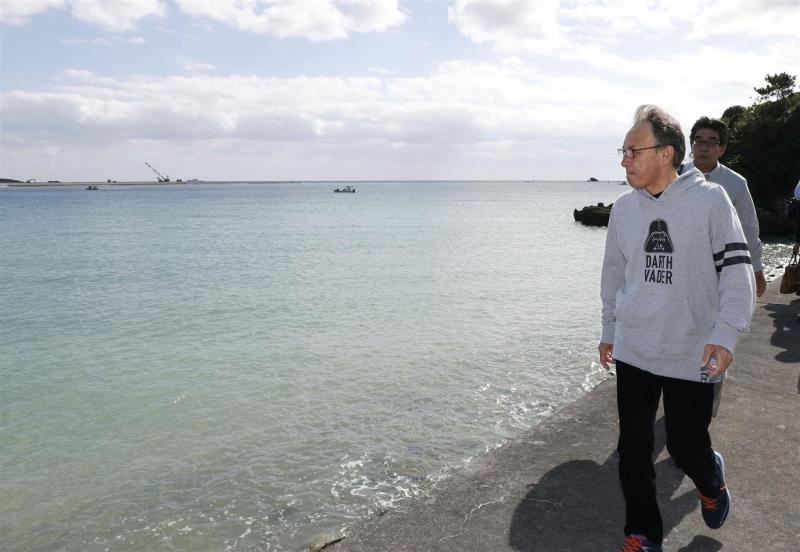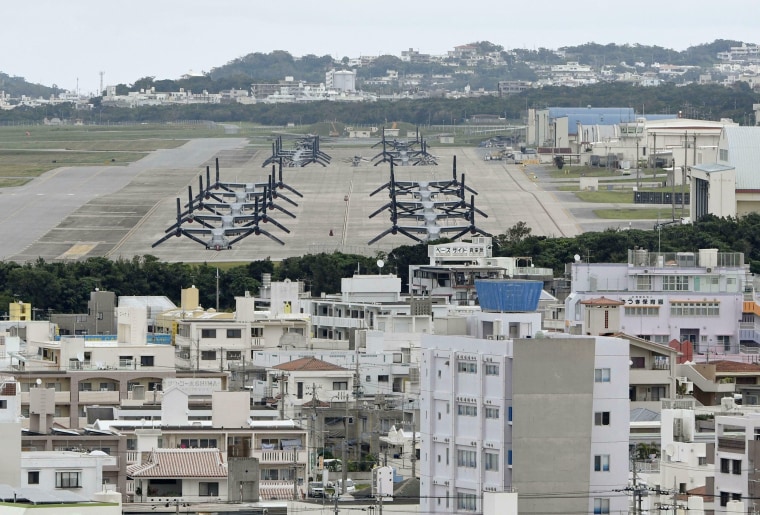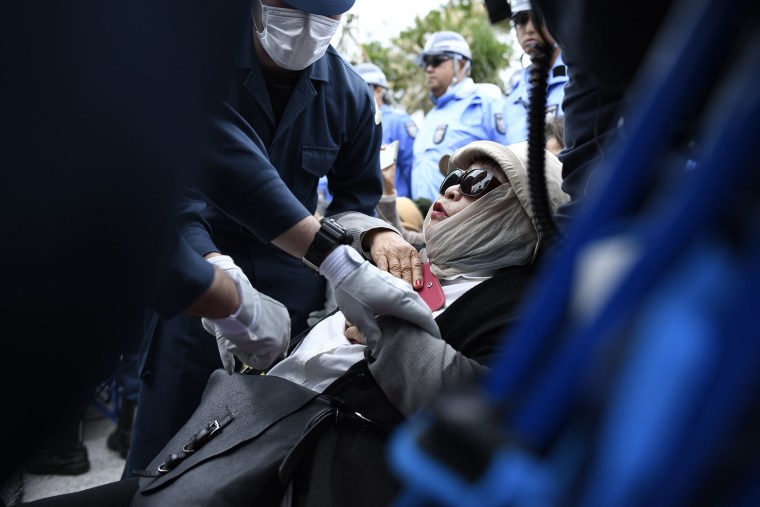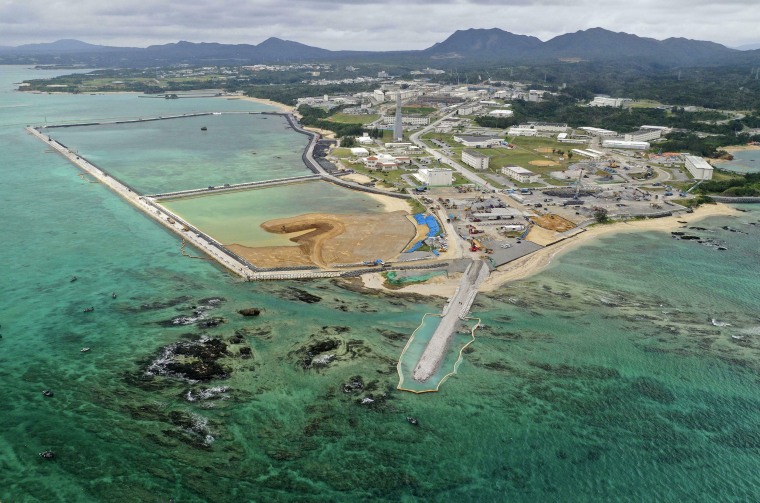Okinawa vote on U.S. military base tests security ties with Japan



TOKYO — Voters are expected to vent their anger this weekend at the heavy concentration of American military bases in Okinawa.
The strategically important chain of islands southwest of the rest of Japan was the battleground for some of the fiercest fighting during World War II. It also served as a staging area for United States forces during the Vietnam War.
But Okinawa hosts about two-thirds of the dedicated U.S.-only bases in Japan despite accounting for less than 1 percent of the country’s land area.
In the last two decades, frustration with the U.S. presence in Okinawa has been building over aircraft accidents, safety concerns, noise pollution, and several high-profile criminal cases involving U.S. military personnel and civilian staff. The two countries reached an agreement to reduce the impact of the U.S. bases after local outrage over the rape of a 12-year-old girl by three U.S. servicemen in 1995.
 U.S. Marine Corps Air Station Futenma is situated in a crowded residential area of Ginowan, Japan. Kyodo / AP
U.S. Marine Corps Air Station Futenma is situated in a crowded residential area of Ginowan, Japan. Kyodo / AP Hiroji Yamashiro, who is head of the Okinawa Peace Movement Center and has led protests against the U.S. bases, said Sunday's vote is a "chance to show residents' overwhelming and unwavering opposition" to the heavy American presence there.
The regional government's referendum is over a contentious plan to relocate a U.S. Marine Corps base 25 miles northeast to a coastal area in Henoko that is next to Camp Schwab, another American facility.
Marine Corps Air Station Futenma is currently located in a crowded residential area in Ginowan, a city that is home to almost 100,000 people, on Okinawa’s main island.

There was a major scare in December 2017 when a window from an American CH-53E transport helicopter fell onto the grounds of an elementary school near where dozens of students were playing.
The school later disclosed that it had ordered students to take shelter 693 times in the year following that incident due to fears about approaching military aircraft.
Residents of Okinawa, which is located close to Taiwan and faces the East China Sea, say their concerns have been ignored for too long and view the looming vote as a chance to make their views crystal clear. Almost 1.2 million voters are eligible to participate in the referendum, which specifically asks about the work associated with the relocation.
While the result of the vote is not legally binding, strong opposition to the plan would be seen as a challenge to longstanding U.S. and Japanese government policy, and a proxy for broader dissatisfaction with the bases.
“Okinawan residents have long campaigned for the removal, reorganization and downsizing of military bases,” said Hiroyuki Teruya, a professor of political science at Okinawa International University. “However, the Japanese government has prioritized the stability of the security treaty and ignored this issue.”
 Protesters stage a rally outside Camp Schwab, which is another U.S. base in Okinawa, on Dec. 12. Richard Atrero de Guzman / Sipa USA via AP file
Protesters stage a rally outside Camp Schwab, which is another U.S. base in Okinawa, on Dec. 12. Richard Atrero de Guzman / Sipa USA via AP file In a poll conducted by Japan's Kyodo News on Feb. 16-17, more than two-thirds of the respondents said they would vote against the base plan. Just one in six planned to vote in favor, according to the poll of 1,047 eligible voters.
Both governments are committed to the relocation plan.
But the new location at Henoko requires landfill work in Oura Bay, prompting opponents to raise environmental concerns.
“By embarking on the reclamation at Henoko, the Abe administration has shown their refusal to listen to the Okinawan public,” said Masaaki Gabe, a professor of international politics and U.S.-Japan relations at Okinawa's University of the Ryukyus.
Gabe cited last year's election win by a gubernatorial candidate who vowed to fight the base transfer over an Abe-government backed rival as suggesting that a majority of people in the region “opposed the new base construction through land reclamation of the natural and beautiful ocean.”
 Land reclamation work is already underway on the relocation site for U.S. Marine Corps Air Station Futenma in Okinawa's Henoko coastal district. Kyodo / AP
Land reclamation work is already underway on the relocation site for U.S. Marine Corps Air Station Futenma in Okinawa's Henoko coastal district. Kyodo / AP Many anti-base campaigners are also demanding a faster reduction in the overall U.S. military footprint in Okinawa and see blocking the relocation as part of that effort.
U.S. Forces Japan comprises some 54,000 military personnel, about half of whom are stationed in Okinawa.
Yoshihide Suga, the Japanese government’s chief Cabinet secretary, said the existing location of the Futenma air station is dangerous as it is close to homes and schools.
“We need to remove this danger and return this space to Okinawa prefecture,” he said at a press conference in Tokyo on Feb. 14.
Suga said the central government would continue to seek the understanding of residents about the need to proceed with the relocation.
However, when asked whether the government would stick to its plan regardless of the referendum’s results, Suga confirmed: “Yes, that’s the basic stance.”
Leading the battle against the base relocation is Denny Tamaki, the governor of Okinawa, who won a large victory at the ballot box in September.
Tamaki, the son of a former U.S. Marine and an Okinawan mother, has said he supports the U.S. alliance, but believes it is abnormal that his region has so many bases when it accounts for only 0.6 percent of Japanese territory.
The governor, who traveled to New York and Washington, D.C., to press his case late last year, argues the impact of military accidents and other incidents spreads beyond the direct victims.
“This anger and sadness is something which all Okinawan people hold inside themselves as well, and many people in Okinawa also struggle with not knowing where to direct this anger and sadness,” Tamaki said during a press conference in Tokyo on Nov. 9.
A referendum in Okinawa Prefecture in 1996 showed 89 percent of participants supported a cut in U.S. military facilities. After that vote, which had a 59 percent turnout, the U.S. pledged to reduce the impact of its presence.
One of the biggest transfers of land occurred in late 2016, when the U.S. handed back to the Japanese government almost 10,000 acres of land from the Northern Training Area.
“After several recent land returns, less than 64 percent of U.S. exclusive-use areas are on Okinawa, while about 36 percent are on mainland,” U.S. Forces Japan said in a statement.
Yamashiro, of the Okinawa Peace Movement Center, said the opposition effort had grown stronger and he hoped officials in Tokyo and Washington listened to the will of the people.
“As soon as the referendum results are shown, both governments should go back to the drawing board on the new base construction at Henoko, and call into question how U.S. military bases should be in Okinawa,” he said
Tags
Who is online
52 visitors

Didn't even know that this was still an issue. Did you?
Dear Friend Perrie: History books about WW II and since read very differently in Japan than in the USA.
Both in terms of what is in, and what is out of them.
Here in this nation Confederate Flags are still an issue.
Historical baggage has duration.
E.
Yes brother, powerful legs that sometimes can carry it for centuries.....
Dear Friend Nowhere Man: The only solution I can see to the problem of historical baggage is to check it at my local airport.
They either lose or send to a wrong location just about any luggage.
Winks.
E.
Yes they do!
It's the fault of the Japanese that we went there in the first place.
Okinawa is too strategically important, especially to Japan and Taiwan, to be given up by the US, or to even to reduce our presence there.
Dear Friend Greg Jone: Good points all.
Thanks for sharing.
Enoch.
Very true. And history is told in the eyes of the victor. Even today, it is not taught about our bombing of Nagasaki and Hiroshima. Yet, we have made amends.
Okinawa is still as strategic today as it was in 1945.
But yes it is still an issue. the Okinawan's outside the government would like to see the US Military just plain gone. And for reasons that are hard to argue with....
But they accept that some US military presence is warranted though, just not carrying the brunt of the US presence in Japan......
There is a lot of baggage there. Amongst which is Okinawa's latent ideal that they are an independent country, a conquered nation, not really part of Japan proper. kinda like the illegitimate step child, they felt this way back in the 30's as well....
They accept Japanese government and claims of possession though. A little hard not to at this point historically.
Kinda sorta... but vaguely...
Good update on an important topic.
This has been an ongoing problem in Japan/Okinawa for decades.
The opposition is getting stronger and stronger in Okinawa.
True enough, Kavika. One day we will have to face a critical decision and it might not be that far away.
I posted an article earlier about the toxic water around bases and base housing.
If we are making our own land toxic, we are probably doing the same at bases overseas.
If one of our bases are doing like they are here and making health problems for our own, such as leaching toxins into the ground and water, these other countries have very legitimate concerns.
This is a ticking time bomb.